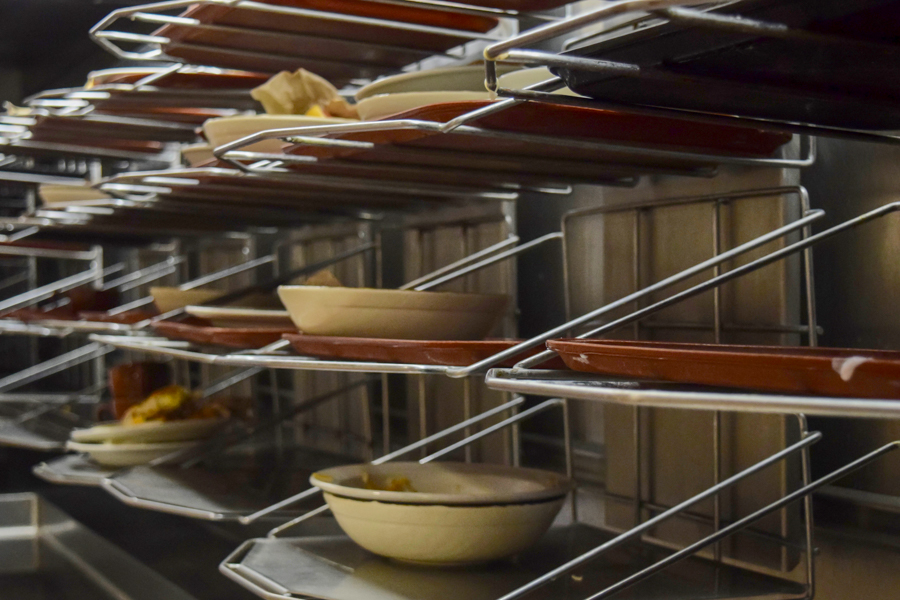
All three dining commons collectively waste record low of 1.5 oz of food per person for Spring Quarter audits
From April 28–30, the UC Davis Dining Commons (DC) conducted their Spring Quarter “Love Food, Don’t Waste” audits. The waste audits took place during the lunch periods of each DC. Every quarter, the DCs collect and analyze data to determine the best ways to reduce food waste.
Students were asked to sort their food waste into four categories: edible food waste, inedible food waste, liquid waste and napkin waste.
For spring 2016, the results showed the lowest food waste per person in the history of the waste audits with an average of 1.5 oz per person for all DCs collectively. Individually, Cuarto contributed 2.79 oz per person, Tercero 2.24 oz per person and Segundo 3.27 oz per person in total for all waste categories for the entire year.
This year, the DC included an incentive of a sundae bar added to all the DCs if each DC reduced food waste numbers compared to last quarter. Each DC will be getting a sundae bar for meeting the quota, with Tercero receiving extra toppings for reducing the most from previous quarters.
Kelly Gaherty, a fourth-year communication major and waste reduction intern, said that there have been improvements from the start of the “Love Food, Don’t Waste” audits. In comparison, data from previous Spring Quarters, like spring 2011 which saw 1.96 oz of food waste per person or spring 2013 which saw 1.82 oz per person, shows the program’s progress.
Adams said that Fall Quarter’s statistics are usually higher than those in Spring Quarter. This school year, fall 2015 contributed 2.23 oz of food waste per person.
“Typically we see all of the areas trend down in spring from fall numbers. Each year is a new population for us! […] After the education throughout the year, it is an overall decrease,” Adams said.
Linda Adams, the DC sustainability and nutrition director, said that “Love Food, Don’t Waste” audits began in fall 2009 by a student’s desire to make the DC more sustainable through collecting data and educating students.
The Just Ask program, which give students the option to customize their meals, and the Try-a-Taste program, which allows students to try a bite of a dish before taking a whole serving, came about because the waste audits provided the DC understanding on how to serve food to reduce post-consumer waste.
The audits not only contribute to UC Davis’ goal of achieving zero-waste by 2020, but also seek to draw attention to food waste as well.
“These audits are definitely a measurement tool for us in reporting waste and diversion to the UC Office of the President,” Adams said. “Nonetheless, food waste is a major problem in almost all sectors of the food system, including our kitchens at home. These audits also serve to draw student/employee attention to this issue.”
Gaherty shared the same sentiments on the importance of food waste reduction.
“Food waste has a huge impact on the environment. We try to connect with the freshmen and engage with them to recognize the impact they have on campus and how much the waste affects our additive waste to the campus,” Gaherty said.
Gaherty said that a common reaction students tend to have with regard to the waste audits.
“Whenever we do waste audits we get reactions like, ‘Oh, you’re the people that make me feel bad about throwing my food out.’ We try and do all the things to stay away from making them feel bad,” Gaherty said. “We just try to make them conscious of their waste, the effect they have on campus, and to think about ways to change their habits in order to benefit the environment, our campus, and their lives in general.”
Students like William Kha, a first-year microbiology major, expressed similar reactions to the waste audits.
“The audits don’t really speak much to me and I tend to ignore the tabling because it seems to be just a repetition of ‘Don’t waste food! It’s bad!’” Kha said. “In effect, they don’t present a reason strong enough to make me consume every bit of my food and be completely aware of how much food I can eat and will eat.”
Adam suggested peer-to-peer discussion to increase awareness around food waste.
“Food waste is an issue we all need to be aware of and strive to be part of the solution. There are some students who are very engaged and others who seem oblivious to the problem,” Adams said. “I think students should advocate amongst their circle of influence for an overall increased awareness of things wasted every day and ways to decrease that waste.”
Written by: Yvonne Leong – campus@theaggie.org










